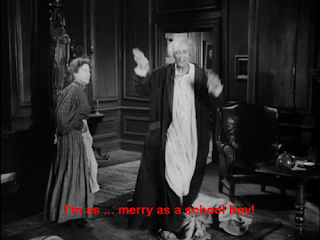It is true that we usually fall back into the same old habits not long after January 1st but our intentions are good. I think that some of the desire to do better and to be better comes from the selfless behavior that is generated during Christmas. We wish that we could continue to appreciate each other and extend ourselves as we have done for the weeks prior to the end of the year. There is a beautiful work of art shown above by the French baroque artist, Simon Vouet created in the seventeenth century. It depicts Love, Hope and Beauty overcoming Father Time. This is the victory that we long for as we make our resolutions. However, the seemingly relentless march of time catches us up with all of the duties and doings that occupy our every waking moment. Promises to change give way to busy schedules.
There is a story that I often tell which relates to this subject. It goes like this:
The Devil has become concerned that there are not enough souls entering into his domain based upon calculations of population increase on Earth. He calls his three minions together and casts blame upon them for declining intake census. They are directed, one at a time, to go up to the land of the living and conduct some research that will turn the tide of souls in Hells favor. There is also a warning that accompanies The Devil’s command, “If your idea does not please me,” says Satan, “You will be reduced into eternal cinders by the power of my rod!” The first minion departs and returns shortly. He is asked for his findings and reports that “All we must do is spread the word that there is no God.” Lucifer becomes enraged. “No God! You fool! If there is no God there is no Me!” He points his dreaded staff at the minion and reduces him to ash. The second minion departs and spends quite a bit more time on Earth wandering about in fear of the consequences. He finally returns and has a slight air of confidence. He tells Satan, “All we must do is tell the people that the holy scriptures of all religions are lies and must be destroyed!” The Devil becomes even more infuriated. He screams, “You idiot! Destroy the scriptures? Have you not heard that the rocks and stones themselves will testify in the absence of The Word?” The quaking minion meets the same fate as his fellow. Satan turns to the third of his subordinates. He said “You better make this good!” The third minion spent a long time in his research on Earth. When he finally returned The Devil was waiting with his staff already prepared for destruction. The little minion raised his hand and, with a slight smile, told Satan this, “I have the answer my Lord. All we have to do is tell the people that they have PLENTY OF TIME.” Satin smiled, knowing that the problem had been solved.
We have this moment, here and now. It is our opportunity to not only make a resolution that will be meaningful, but one that will truly overcome Father Time. It is summed up in the wisdom and teachings of the ages. We should not discount it for what seems to be simplicity. For it is far from simple. The ultimate resolution is this. Love one another. After all is said and done; only love endures.































